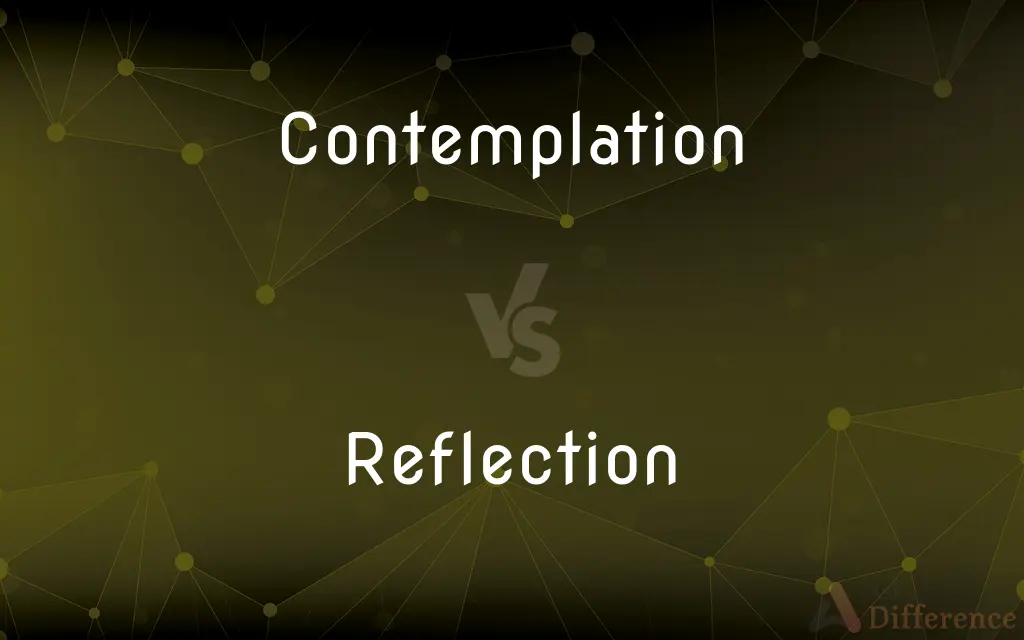Contemplation vs. Reflection — What's the Difference?
Edited by Tayyaba Rehman — By Fiza Rafique — Updated on April 20, 2024
Contemplation involves deep, prolonged thought often on spiritual or abstract topics, while reflection focuses on introspective examination of past events or personal experiences.

Difference Between Contemplation and Reflection
Table of Contents
ADVERTISEMENT
Key Differences
Contemplation is generally considered a more profound, often spiritual or philosophical engagement with a concept or idea. It typically involves extended thinking that can lead to insights or deeper understanding. Reflection, on the other hand, is more about looking back at actions, events, or decisions, and evaluating or learning from them. This process is introspective, aimed at personal growth or understanding.
While contemplation can be directed towards theoretical or existential questions without a direct connection to one's personal life, reflection is inherently personal and often tied to specific experiences or choices. Contemplation might explore the nature of happiness, whereas reflection might examine a specific instance when one felt happy or sad.
Contemplation often requires a quiet, distraction-free environment to deeply think about broad, often complex topics. Reflection, however, can occur anytime as one looks back on recent experiences or conversations, pondering their implications or lessons learned.
In practice, contemplation might lead one to engage in meditation or other practices that facilitate deep thought and focus. Reflection, on the other hand, might involve journaling or discussing past events with others to gain clarity or perspective.
Both contemplation and reflection are valuable mental exercises, but their purposes differ: contemplation seeks understanding and insight on a broad scale, while reflection aims to understand and learn from one’s past behaviors or experiences.
ADVERTISEMENT
Comparison Chart
Focus
Broad, often abstract or spiritual topics
Personal experiences or specific past events
Purpose
Gain deep insights or understanding
Evaluate and learn from past experiences
Typical Activities
Meditation, quiet thinking
Journaling, discussing
Time Orientation
Can be timeless or futuristic
Primarily past-oriented
Outcome
Theoretical understanding, personal insights
Personal growth, practical learning
Compare with Definitions
Contemplation
A state of being where one is lost in thought away from immediate surroundings.
The philosopher spent hours in contemplation.
Reflection
Introspective consideration or deliberation.
His nightly reflections kept his goals aligned with his actions.
Contemplation
Prolonged, deep thought, especially on a spiritual or philosophical level.
He found peace through the contemplation of nature.
Reflection
A method of personal assessment and learning.
Reflection on her performance revealed areas for improvement.
Contemplation
Consideration of abstract or complex concepts without immediate practical application.
Her contemplation of life’s meaning often left her lost in thought.
Reflection
A process by which experiences are reviewed for personal understanding.
Through reflection, she understood the reasons behind her choices.
Contemplation
The act of looking thoughtfully at something for a long time.
His contemplation of the painting revealed its deeper emotions.
Reflection
The act of thinking back on past events or experiences.
His reflection on past mistakes helped him grow.
Contemplation
A deliberate and focused thought process.
Contemplation of the ethical implications is necessary before decision-making.
Reflection
A mental process of analyzing and considering past actions.
Quiet reflection is often needed after a busy day.
Contemplation
Whilst in the life of the intellect 'contemplation' refers to thinking profoundly about something, in the religious life contemplation is a kind of inner vision or seeing, transcendent of the intellect, facilitated by means of practices such as prayer or meditation.
Reflection
The act of reflecting or the state of being reflected.
Contemplation
The act or state of contemplating.
Reflection
Something, such as light, radiant heat, sound, or an image, that is reflected.
Contemplation
Thoughtful observation or study.
Reflection
Serious thinking or careful consideration
Engaged in reflection on the problem.
Contemplation
Meditation on spiritual matters, especially as a form of devotion.
Reflection
A thought or an opinion resulting from such thinking or consideration
Wrote down her reflections.
Contemplation
Intention or expectation
Sought further information in contemplation of a career change.
Reflection
An indirect expression of censure or discredit
A reflection on his integrity.
Contemplation
The act of contemplating; musing; being highly concentrated in thought
Reflection
A manifestation or result
Her achievements are a reflection of her courage.
Contemplation
Holy meditation.
Reflection
The folding of a membrane from the wall of a cavity over an organ and back to the wall.
Contemplation
The act of looking forward to a future event
Reflection
The folds so made.
Contemplation
The state of being considered or planned.
Reflection
The act of reflecting or the state of being reflected.
Contemplation
The act of the mind in considering with attention; continued attention of the mind to a particular subject; meditation; musing; study.
In contemplation of created things,By steps we may ascend to God.
Contemplation is keeping the idea which is brought into the mind for some time actually in view.
Reflection
The property of a propagated wave being thrown back from a surface (such as a mirror).
Contemplation
Holy meditation.
To live in prayer and contemplation.
Reflection
Something, such as an image, that is reflected.
The dog barked at his own reflection in the mirror.
Contemplation
The act of looking forward to an event as about to happen; expectation; the act of intending or purposing.
In contemplation of returning at an early date, he left.
Reflection
Careful thought or consideration.
After careful reflection, I have decided not to vote for that proposition.
Contemplation
A long and thoughtful observation
Reflection
An implied criticism.
It is a reflection on his character that he never came back to see them.
Contemplation
A calm lengthy intent consideration
Reflection
(computing) The process or mechanism of determining the capabilities of an object at run-time.
Reflection
(anatomy) The folding of a part; a fold.
Reflection
The act of reflecting, or turning or sending back, or the state of being reflected.
The eye sees not itself,But by reflection, by some other things.
Reflection
The reverting of the mind to that which has already occupied it; continued consideration; meditation; contemplation; hence, also, that operation or power of the mind by which it is conscious of its own acts or states; the capacity for judging rationally, especially in view of a moral rule or standard.
By reflection, . . . I would be understood to mean, that notice which the mind takes of its own operations, and the manner of them, by reason whereof there come to be ideas of these operations in the understanding.
This delight grows and improves under thought and reflection.
Reflection
Shining; brightness, as of the sun.
Reflection
That which is produced by reflection.
As the sun water we can bear,Yet not the sun, but his reflection, there.
Reflection
A part reflected, or turned back, at an angle; as, the reflection of a membrane.
Job's reflections on his once flourishing estate did at the same time afflict and encourage him.
Reflection
Censure; reproach cast.
He died; and oh! may no reflection shedIts poisonous venom on the royal dead.
Reflection
The transference of an excitement from one nerve fiber to another by means of the nerve cells, as in reflex action. See Reflex action, under Reflex.
Reflection
A calm lengthy intent consideration
Reflection
The phenomenon of a propagating wave (light or sound) being thrown back from a surface
Reflection
Expression without words;
Tears are an expression of grief
The pulse is a reflection of the heart's condition
Reflection
The image of something as reflected by a mirror (or other reflective material);
He studied his reflection in the mirror
Reflection
A likeness in which left and right are reversed
Reflection
(mathematics) a transformation in which the direction of one axis is reversed
Reflection
A remark expressing careful consideration
Reflection
The ability to reflect beams or rays
Common Curiosities
What is the main purpose of contemplation?
The main purpose of contemplation is to engage deeply with broad, often philosophical or spiritual topics to gain insights.
Is reflection always about negative past experiences?
No, reflection can be about positive, neutral, or negative experiences, as it serves to analyze and learn from any past events.
What are typical activities associated with contemplation?
Typical activities include meditation, spending time in nature, or any quiet, focused environment conducive to deep thought.
Can contemplation be focused on personal experiences?
While contemplation can occasionally incorporate personal experiences, it generally focuses on broader, more abstract concepts.
Is there a specific time best suited for reflection?
Reflection can be beneficial at any time but is often practiced after events or at the end of the day to process daily experiences.
What differentiates reflection from contemplation in terms of outcomes?
Reflection typically results in personal growth and practical learning, whereas contemplation aims at gaining a theoretical understanding or insight.
Can reflection lead to changed behavior?
Yes, reflection often leads to insights that encourage changes in behavior to better align with one's values and goals.
How does reflection help an individual?
Reflection helps by allowing an individual to evaluate past behaviors and experiences, promoting personal growth and learning.
What skills are enhanced by regular contemplation?
Regular contemplation can enhance skills such as focus, critical thinking, and the ability to engage with complex ideas.
What are the emotional benefits of contemplation?
Contemplation can lead to emotional benefits such as reduced stress, increased self-awareness, and a greater sense of peace.
Can reflection be a collaborative activity?
Yes, reflection can be collaborative when shared with others, providing multiple perspectives and deeper insights.
How does contemplation differ from daydreaming?
Contemplation is a more structured and purposeful process of thought compared to the often whimsical and unfocused nature of daydreaming.
How does contemplation impact decision-making?
Contemplation provides a deeper understanding and perspective, which can lead to more informed and thoughtful decisions.
Is it necessary to have a quiet environment for reflection?
While a quiet environment can enhance reflection, it is not strictly necessary as reflection can occur in various settings.
How does reflection assist in problem-solving?
Reflection helps in problem-solving by allowing individuals to review and assess past solutions and their outcomes, informing better decisions.
Share Your Discovery

Previous Comparison
Baijiu vs. Kaoliang
Next Comparison
Millage vs. MileageAuthor Spotlight
Written by
Fiza RafiqueFiza Rafique is a skilled content writer at AskDifference.com, where she meticulously refines and enhances written pieces. Drawing from her vast editorial expertise, Fiza ensures clarity, accuracy, and precision in every article. Passionate about language, she continually seeks to elevate the quality of content for readers worldwide.
Edited by
Tayyaba RehmanTayyaba Rehman is a distinguished writer, currently serving as a primary contributor to askdifference.com. As a researcher in semantics and etymology, Tayyaba's passion for the complexity of languages and their distinctions has found a perfect home on the platform. Tayyaba delves into the intricacies of language, distinguishing between commonly confused words and phrases, thereby providing clarity for readers worldwide.















































